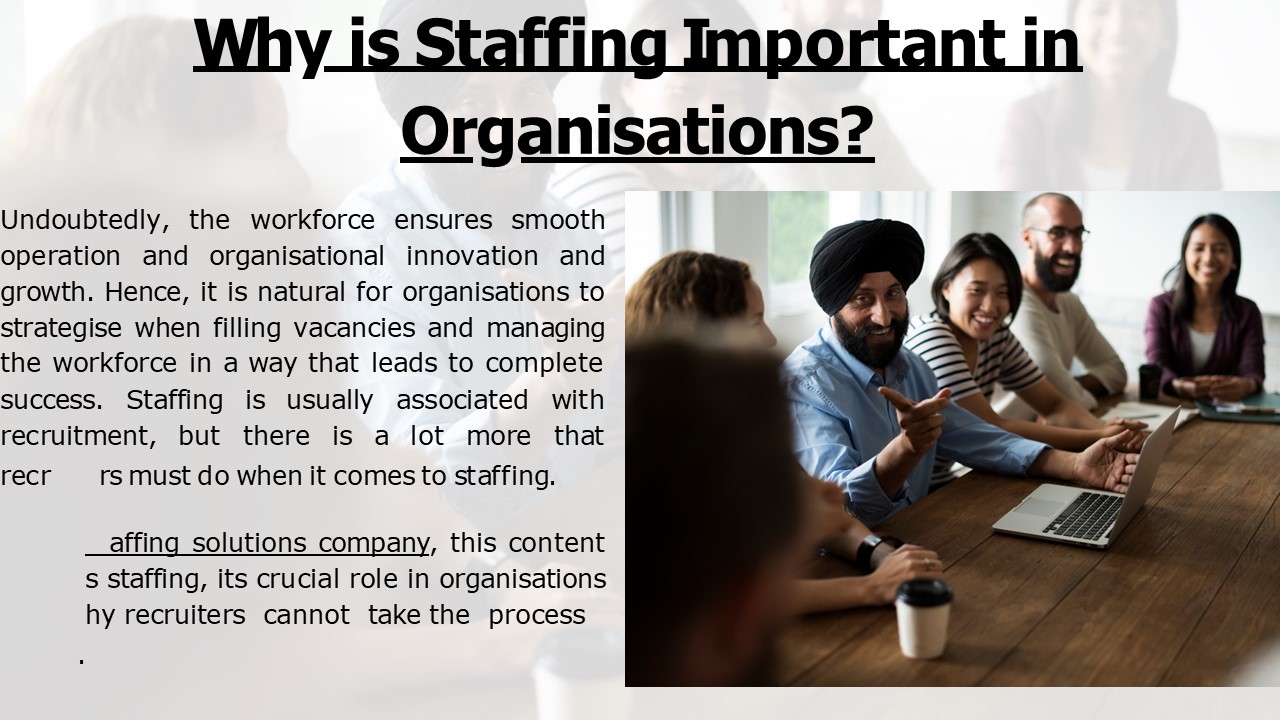Why is Staffing Important in Organisation - PowerPoint PPT Presentation
Title:
Why is Staffing Important in Organisation
Description:
Want to know why finding and keeping great employees is super important for your business? This PDF breaks down how having the right people in the right places can make all the difference! – PowerPoint PPT presentation
Number of Views:3
Title: Why is Staffing Important in Organisation
1
Why is Staffing Important in
Organisations?
- Undoubtedly, the workforce ensures smooth
operation and organisational innovation and
growth. Hence, it is natural for organisations to
strategise when filling vacancies and managing
the workforce in a way that leads to complete
success. Staffing is usually associated
recruitment, but there is a lot more
with that
recr rs must do when it comes to staffing.
affing solutions company, this content s
staffing, its crucial role in organisations hy
recruiters cannot take the process .
2
1. Sourcing Candidates to Execute Work Towards
Goals
Every company has a set of specific goals, goals
accomplished only with the best staff holding the
appropriate skill sets. Through contributions
from each employee, all efforts focus on
achieving the organisation's goals in a record
time. Given the importance of the workforce,
companies must strategically hire and place
candidates in their organisation based on their
skills, character, and ability to handle
pressure. To do this, companies must find the
best source of candidates and assess and
interview them to make the best selection for
their requirements. 2. Boosting Productivity
Output
ies making the best selections benefit immensely t
hrough boosted productivity and high ach role
requires filling with an experienced candidate
able to apply their skills effectively and e
smooth operations.
Co
affing decisions have opposite effects and can
negatively impact an organisation's operations.
employees don't perform, the result is an
increased burden for other staff and poor
quality utput.
3
Ultimately, it leads to unsatisfacto ork and reduc
ed efficiency as a complete workforce.
Organisations must work to keep the workforce
engaged and motivated to ensure all proceeds are
on
the right course.
3. Ensuring Positive Reassuring Employee Morale
Staffing is among the most vital core operations
in an organisation. Fluctuations in the
workforce's skills and morale can affect the
organisation's productivity. The most productive
and exceptionally performing employees are the
motivated and happy ones, and knowing how to
accomplish this is beneficial. Ensuring the
workforce has positive morale and is experiencing
job satisfaction works to prevent high
workl ads, burnout and poor efficiency. Immediate
filling of vital positions, training, and
prioritising yee well-being are methods of
ensuring positive employee morale. Strive Towards
Growth Innovation ny innovation arises through
employees and the diverse skills and perspectives
they possess. ng candidates from varied
backgrounds, companies can increase the chance of
employee-driven novation and growth
4
Ensuring innovation is essential for or ni tions
looking to advance and lead their competitors in
the market. Growth and innovation contribute
toward long-term success and the ability to adapt
to market fluctuations.
5. Create Workforce Stability
The ability of established organisations to
maintain a consistent workforce is a commendable
quality that every organisation wants to have.
It helps to ensure accountability for each task
and a consistent workflow throughout the
workforce. 6. Reduced Staffing Costs HR
departments will agree that the complete staffing
process from start to finish isn't easy or cheap!
It highly important for organisations to
implement efficient processes and retain valuable
staff. ting in staff and retaining them,
organisations save money by not having to invest
in the g process all over again. Exceptional
staffing doesn't just eliminate the costs
associated with g but also stress and output
fluctuation.
5
7. Adherence to Compliance Risk Reduction
Persisting within the lines of government and
other regulatory body rules and regulations is
mandatory to avoid legal risks. It requires
recruiters to handle several aspects of staffing,
such as labour, health and safety and
tax. Managing compliance to reduce regulatory
and legal staffing issues requires organised
record maintenance, planning, and knowledge of
rules and regulations. Government rules and
regulations can change regularly, meaning
recruiters must stay updated on the latest rules
and regulations trends. Companies can receive
help from staffing companies in Mumbai who are
well-versed with compliance requirements.
6
Conclusion
Staffing is an extensive term that covers more
than screening, interviewing, and assessing
candidates in the hopes of finding a suitable
candidate for the position. It is a highly vital
process that comprises sourcing, placing, and
managing candidates and managing compliance and
well-being while ensuring efforts align with the
organisation's goals and objectives. With much
focus on the workforce, organisations must invest
and implement strategic practices to ensure a
unified drive towards organisational and personal
goals.































